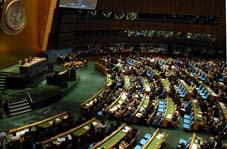UN confirms refugees’ right to return to Abkhazia, South Ossetia
By Temuri Kiguradze
Friday, September 11

The resolution “Underlines the need for the development of a timetable to ensure the voluntary, safe, dignified and unhindered return of all internally displaced persons and refugees affected by the conflicts in Georgia to their homes.” The resolution, entitled ‘Status of Internally Displaced Persons and Refugees from Abkhazia, Georgia and the Tskhinvali region/South Ossetia, Georgia’, also underlined the importance of the Geneva negotiations, established after last August’s Russian-Georgian war, for the return of the refugees. The UN appealed to “all participants in the Geneva discussions to intensify their efforts to establish a durable peace, to commit to enhanced confidence building measures and take immediate steps to ensure the respect for human rights and create favourable security conditions conducive to a voluntary, safe, dignified and unhindered return of all internally displaced persons and refugees to their places of origin.”
The resolution was adopted with 48 countries voting in favour and 19 against, with 78 abstentions. The main opponent of the resolution was Russia, which demanded the removal of this vote from Assembly’s agenda. Russia protested against mentioning Abkhazia and South Ossetia as parts of Georgia in the document. “The UN resolution has a politicised meaning and may harm the Geneva discussions on this issue. Its adoption distracts attention from real work in the region and will not serve to strengthen trust between the Georgian, Abkhazian and South Ossetian sides,” stated Russian Foreign Ministry spokesperson Andrey Nesterenko on September 10. Russia was supported by 18 other countries, including Georgia’s neighbours Armenia and Iran. The other states voting against the resolution were Algeria, Belarus, Bolivia, Cuba, The People’s Democratic Republic of Korea, Ecuador, Ethiopia, India, Myanmar, Nicaragua, Syria, Sri Lanka, Venezuela, Laos, Vietnam and Zimbabwe.
Tbilisi has hailed the UN resolution, calling it the “defeat” of Russian diplomacy. In a televised statement Georgian President Mikheil Saakashvili announced that Russia had “used all the forms of blackmail and bribery it had at its disposal, which it inherited from the Soviet Union,” to try and gain the support of other countries and make them vote against the resolution. “This diplomatic defeat is both strange and shameful for Russia’s current Government, because in accordance with this resolution people expelled and deprived of their property should be returned,” Saakashvili said. “Despite Russia’s huge pressure, this time all EU member states supported the right of unconditional return of the internally displaced persons,” Saakashvili added.
The Georgian Foreign Ministry published the following statement on September 10: “The resolution of the UN General Assembly underlines the urgent need for unlimited humanitarian activity on the whole territory of Georgia, including Abkhazia and South Ossetia. This article has a special meaning because the Russian Federation and its puppet regimes [in Abkhazia and South Ossetia] won’t let humanitarian missions and international organisations enter the occupied territories. The Foreign Ministry is especially thankful to those 47 countries who supported the resolution with Georgia. Those countries are Albania, Andorra, Australia, Austria, Azerbaijan, Belgium, Bosnia and Herzegovina, Bulgaria, Canada, Croatia, Czech Republic Denmark, Estonia, Finland, France, Germany, Greece, Hungary, Iceland, Ireland, Italy, Japan, Latvia, Liechtenstein, Lithuania, Luxembourg, Malta, Monaco, Montenegro, Netherlands, New Zealand, Norway, Poland, Portugal, Romania, Saint Lucia, San Marino, Slovakia, Slovenia, Spain, Sweden The Former Yugoslav Republic of Macedonia, Uganda, Ukraine, the United Kingdom, the United States and Vanuatu.” The Ministry also noted that the resolution witnesses to the fact that “the Russian Federation has become the hostage of its destructive policy towards Georgia and its illegal decision of 26 August 2008 [the recognition of the Georgian breakaway regions].”
“The UN resolution is an obvious step forward, it is a reflection of the global trend. The international community has finally recognised who is behind the conflicts in Georgia and who is responsible for those thousands of people left without homes in Abkhazia and South Ossetia,” Georgian conflict expert Giorgi Khutsishvili told The Messenger on Thursday. He also recalled that the last UN resolution which recognised the right of ethnic Georgians to return to Abkhazia was adopted by only 14 votes to 11, with 105 abstentions. “Now we see that many more countries have supported the resolution and that means that fear of Russia has significantly decreased in the world,” concluded the expert.
According to the Georgian Ministry for Refugees and Accommodation more than 290,000 internally displaced persons currently reside in Georgia. More than 80 percent of these were driven from Abkhazia, the rest from South Ossetia.
